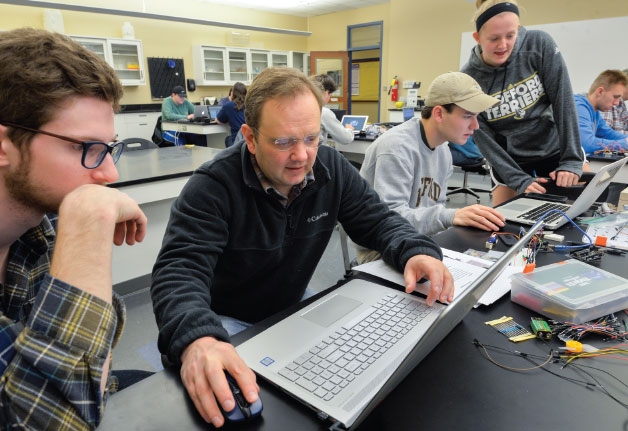Wofford College again has been named to The Princeton Review’s list of “Colleges That Pay You Back: The 200 Schools that Give You the Best Bang for Your Tuition Buck,” released recently. The publication recognizes the nation’s best colleges and universities providing an excellent education at an affordable price.
The institutions in the book “stand out for their outstanding academics and their affordability via generous financial aid to students with need and/or comparatively low sticker prices,” says Robert Franek, The Princeton Review’s editor-in-chief and lead author of the book. “Students at these colleges also have access to extraordinary career services from their freshman year on, plus a lifetime of valuable alumni support.”
Wofford also recently was ranked in Kiplinger’s Personal Finance’s “300 Best College Values for 2018,” at #128 among all colleges and universities in the list and #61 among national liberal arts colleges. The college consistently lands on other “best value” lists in national college guide publications, including Forbes, Money and U.S. News & World Report. The New York Times has recognized Wofford as a college “doing the most for the American Dream,” making a college education possible for low-income students.
“Wofford’s recognition as a best value by these national college guides and publications reflects our long-term commitment to balancing two important priorities: offering an outstanding residential academic program and focusing on affordability for a wide range of students and their families,” President Nayef Samhat says. “Wofford is committed to making our extraordinary and transformational educational experience accessible to all students.
“We also are committed to student success and completion of college in four years, helping to limit the costs to students and their families,” Samhat adds. “Each semester that a student extends beyond four years means extra costs, maybe even additional loans. In addition to the compounded cost of tuition, students who do not graduate in four years incur lost opportunity costs – lost wages or lost time that could be spent earning an advanced degree.”
An ABC financial fitness special in 2016 estimated the cost of delaying graduation by even one year at more than $155,000, including tuition and interest on loans, missed income and compounded retirement savings.
“Everything we do at Wofford is driven by student success,” Samhat says. To further improve retention and completion, Wofford began a five-year Student Success Quality Enhancement Plan in the 2015-16 academic year. The college provides Student Success Teams of advisers and mentors to help students achieve graduation in four years, thus reducing the financial burden on families.
In the two-page profile of Wofford in The Princeton Review publication, the editors note that more than 90 percent of the college’s students receive some form of financial aid. “And that’s likely why undergrads praise the school’s ‘incredible financial aid.’ Wofford awards over $55 million in scholarships and grants, and they make the process easy for incoming students as all applicants are automatically considered for merit scholarships.”
The publication notes that Wofford has a high acceptance rate to graduate schools and that its students say that the college provides them with “many opportunities to pursue [their] career goals.” It notes that The Space in the Mungo Center at Wofford provides full-service professional development and entrepreneurship assistance, giving students a “jump-start on their interview prep, networking and resume writing skills. The career counselors here provide students with actionable job search strategies that make landing that first job surprisingly easy. The average starting salary for recent Wofford graduates is $48,800, according to PayScale.com.”
Curt McPhail, executive director of The Space, says, “We teach students critical thinking and communications skills, then empower them with opportunities for real-world experience, building on their liberal arts education. Employers and graduate schools are looking for people with these skills.”
To review the profiles of Wofford and the other institutions included in the latest edition of “Colleges That Pay You Back,” go to www.princetonreview.com/colleges-pay-you-back.
By Laura Hendrix Corbin
